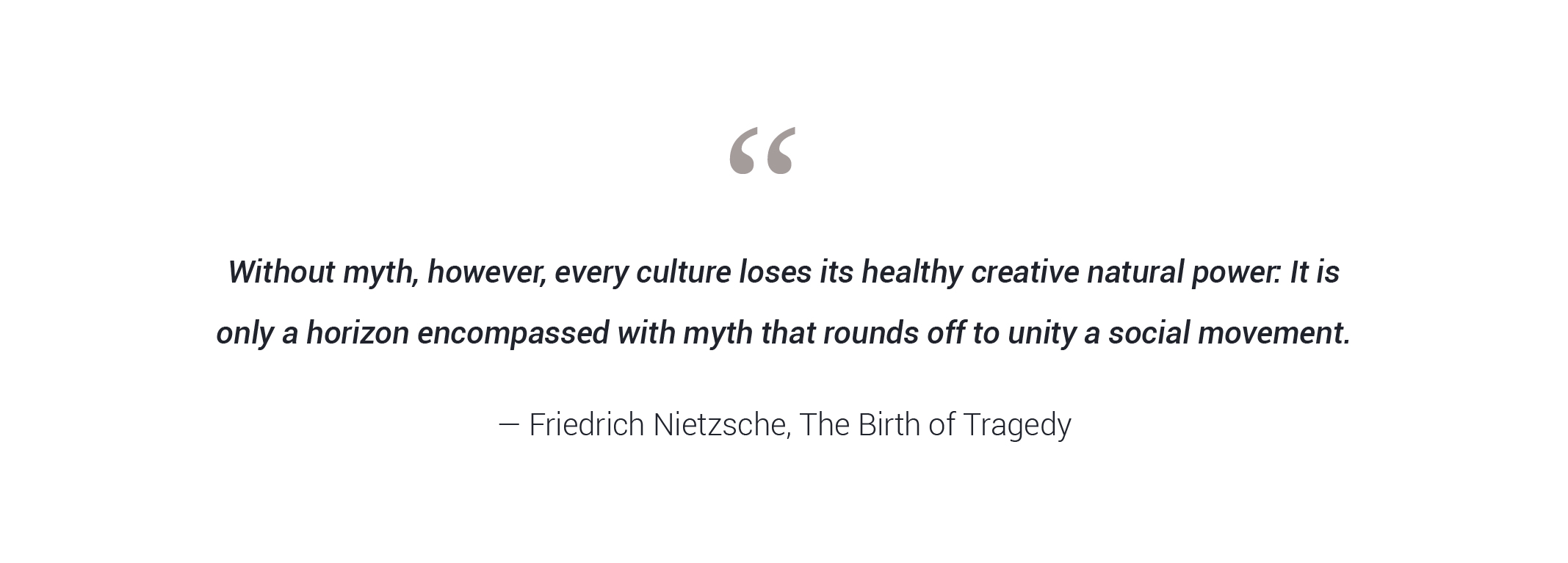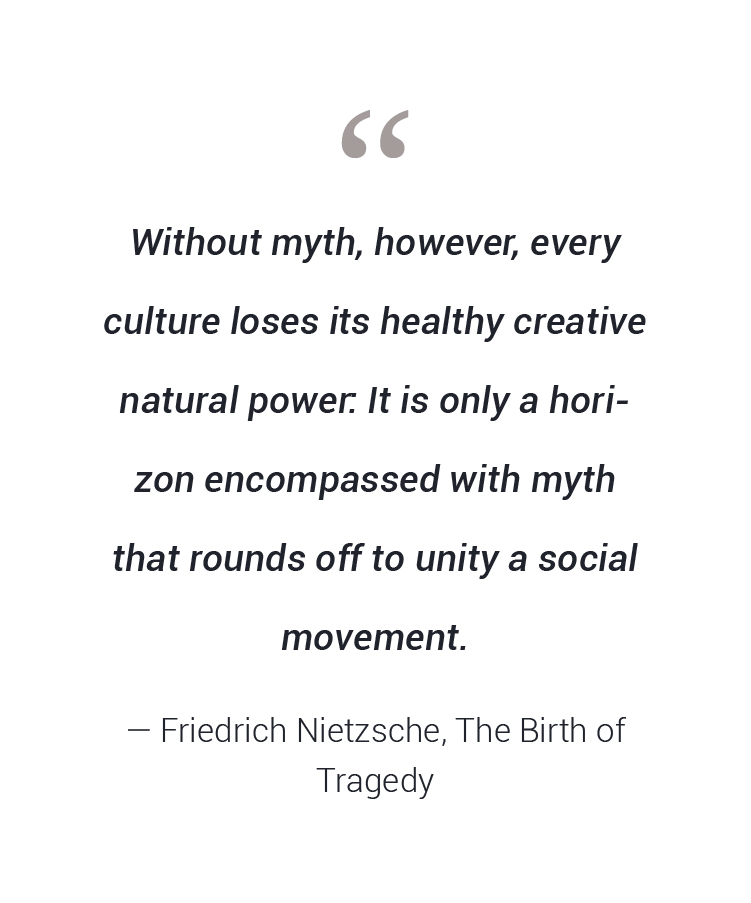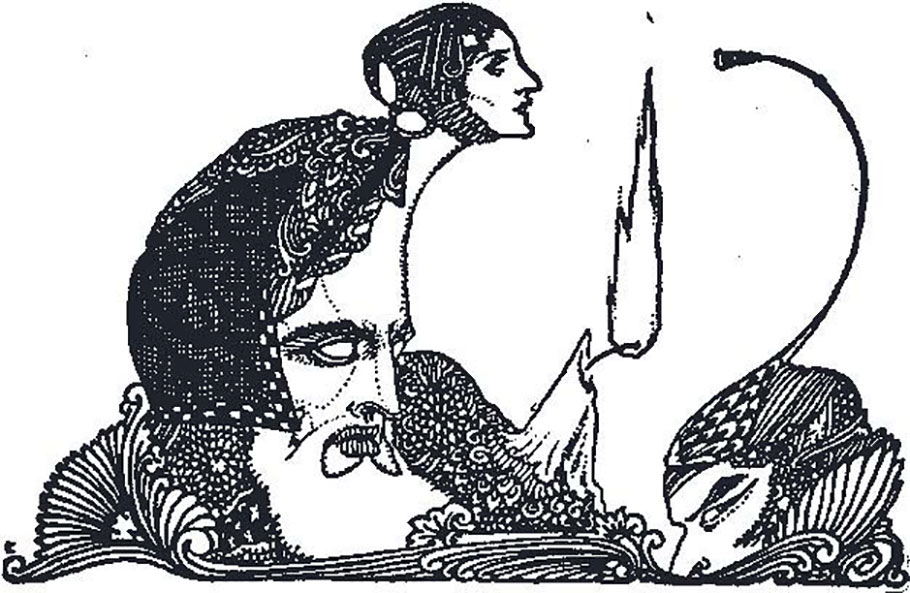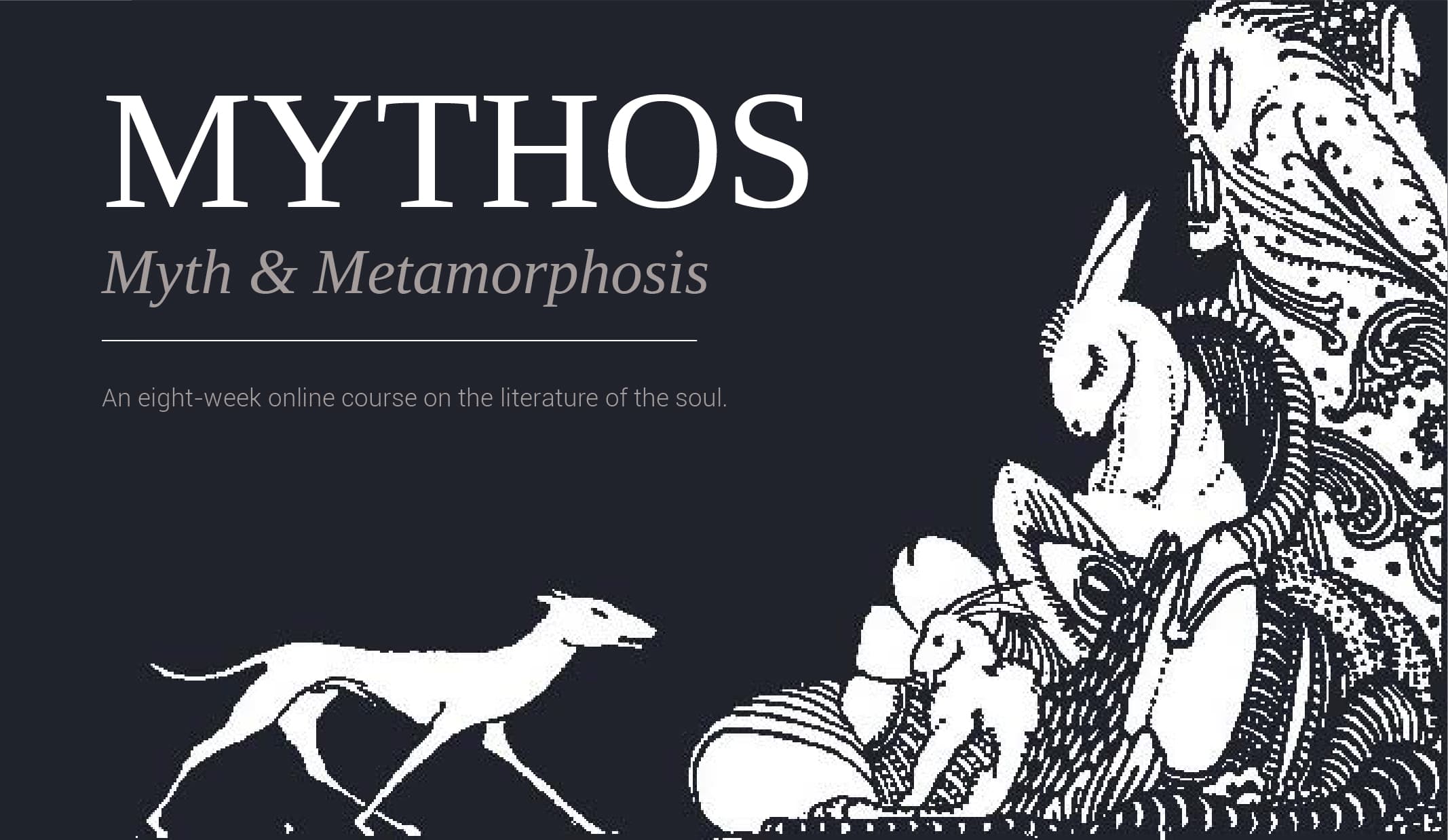
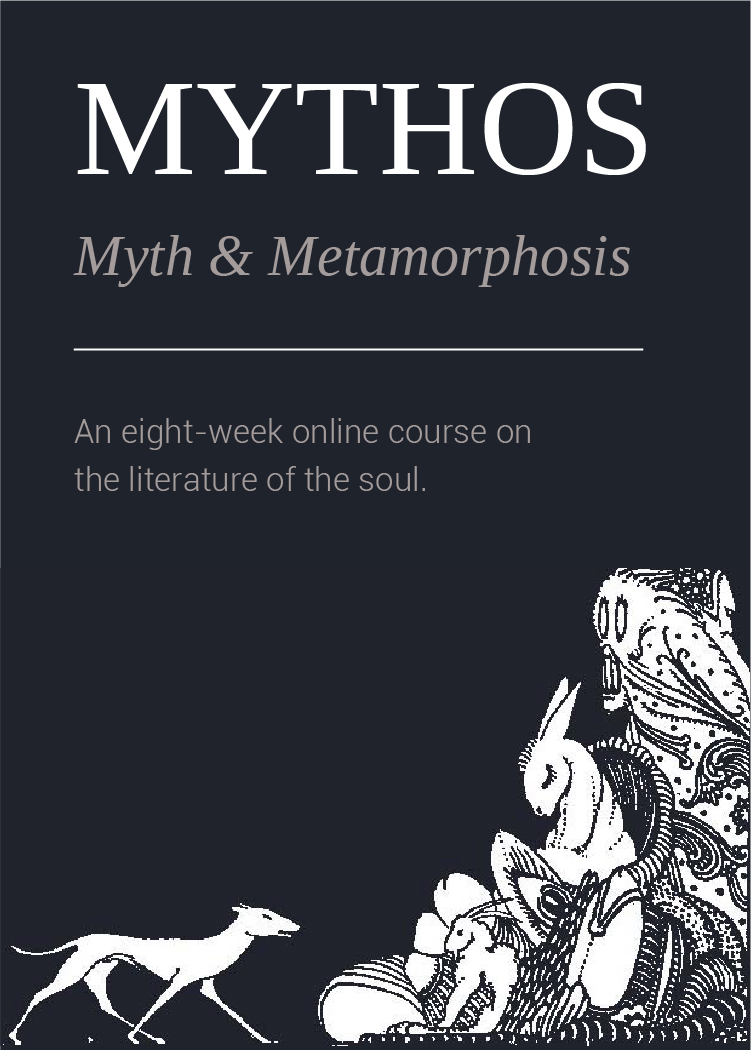
Carl Gustav Jung (1875 -1961) recognised in mythology the leitmotifs, imaginal landscapes, and narrative structures ubiquitously present in the human unconscious. This discovery directly inspired and informed his keystone contribution to depth psychology of the Collective Unconscious. Mythos will be a study of and engagement with the symbols, archetypes, and metaphorical character of myth in structuring the unconscious, and a consideration of its significance for individuation.
REGISTRATION NOW OPEN!
Registration closes Thursday 7th of October at midnight (Pacific).
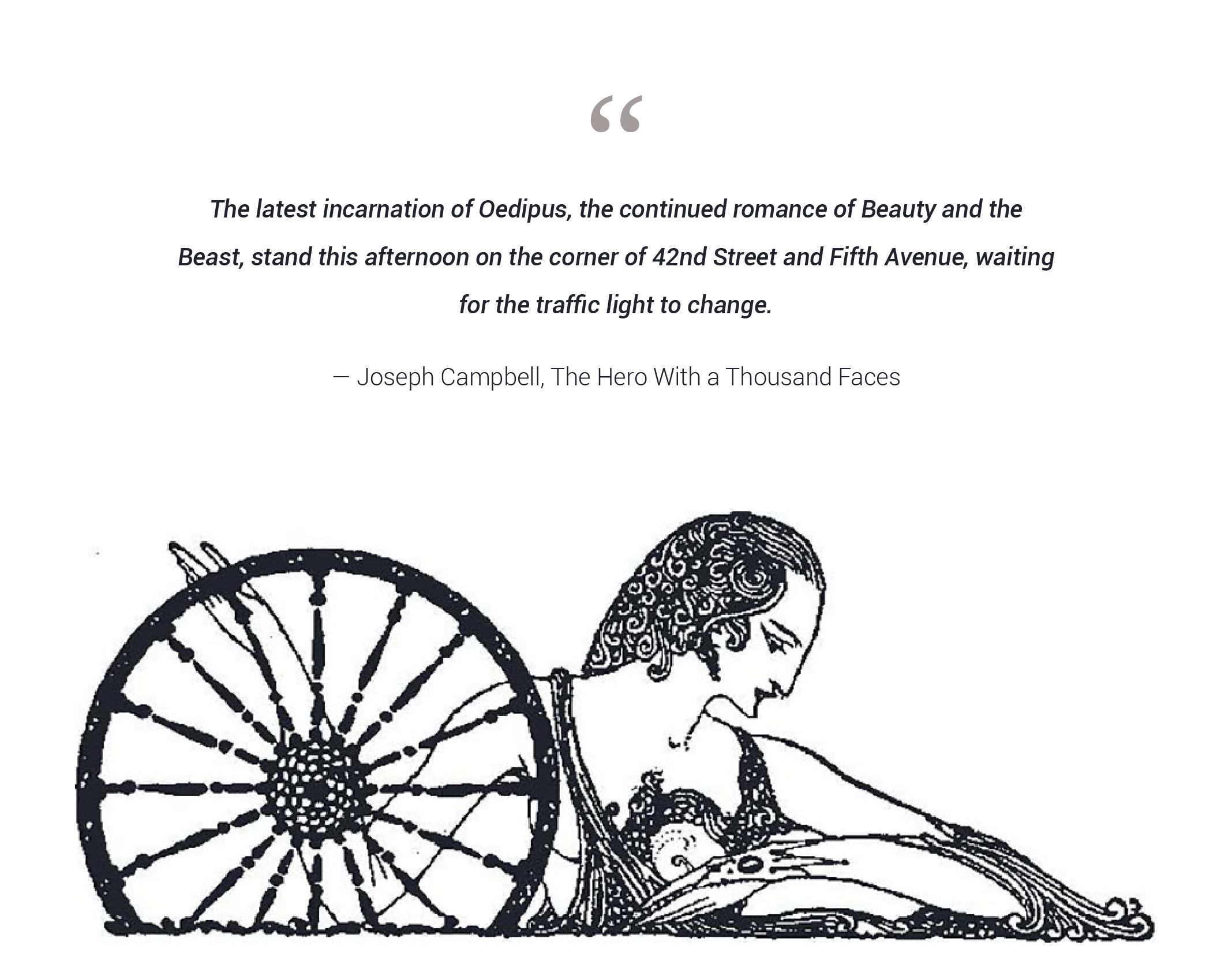

COURSE STRUCTURE & CONTENT
Mythos comprises a live and recorded formal lecture series, reading pack, Applied Jung application and membership of a student forum for the duration of the course. This signature Centre for Applied Jungian Studies approach facilitates learning at both the theoretical (objective) and personal (subjective) registers.
COURSE STRUCTURE & CONTENT
Mythos comprises a live and recorded formal lecture series, reading pack, Applied Jung application and membership of a student forum for the duration of the course. This signature Centre for Applied Jungian Studies approach facilitates learning at both the theoretical (objective) and personal (subjective) registers.
LECTURE SERIES
Jung and Myth
by Prof. Roderick Main
Myth and Science
by Prof. Dylan Futter
The Faustian Myth and its Significance for Jung
by Prof. Paul Bishop
Prometheus, and Pandora
by Nadia Sels, PhD
The Myth of Adonis
by Prof. Robert Segal
‘Dreaming the Myth Onward’: The Re-invention of Myth in Neil Gaiman’s Sandman
by Kevin Lu, PhD
The Yanomami Mythology
by Hannah Hennebert, PhD
The Lotus Gaze: Love and Longing in the Ramayana
by Sulagna Sengupta, MA
Reimagining My Own Story
by Dr Gcina Mhlophe
Franz Kafka: Connoisseur of Mythical Thinking
by Prof. Stanley Corngold
APPLICATION
Over the course of 8-weeks you will be guided through a process of identifying and understanding a personal structuring mythology, and its role and meaning in your life and psychology. This will be an experiential, guided, and interactive process with the programme facilitation team and other students on the programme.
LECTURE SERIES
Jung and Myth
by Prof. Roderick Main
Myth and Science
by Prof. Dylan Futter
The Faustian Myth and its Significance for Jung
by Prof. Paul Bishop
Prometheus, and Pandora
by Nadia Sels, PhD
The Myth of Adonis
by Prof. Robert Segal
‘Dreaming the Myth Onward’: The Re-invention of Myth in Neil Gaiman’s Sandman
by Kevin Lu, PhD
The Yanomami Mythology
by Hannah Hennebert, PhD
The Lotus Gaze: Love and Longing in the Ramayana
by Sulagna Sengupta, MA
Reimagining My Own Story
by Dr Gcina Mhlophe
Franz Kafka: Connoisseur of Mythical Thinking
by Prof. Stanley Corngold
APPLICATION
Over the course of 8-weeks you will be guided through a process of identifying and understanding a personal structuring mythology, and its role and meaning in your life and psychology. This will be an experiential, guided, and interactive process with the programme facilitation team and other students on the programme.
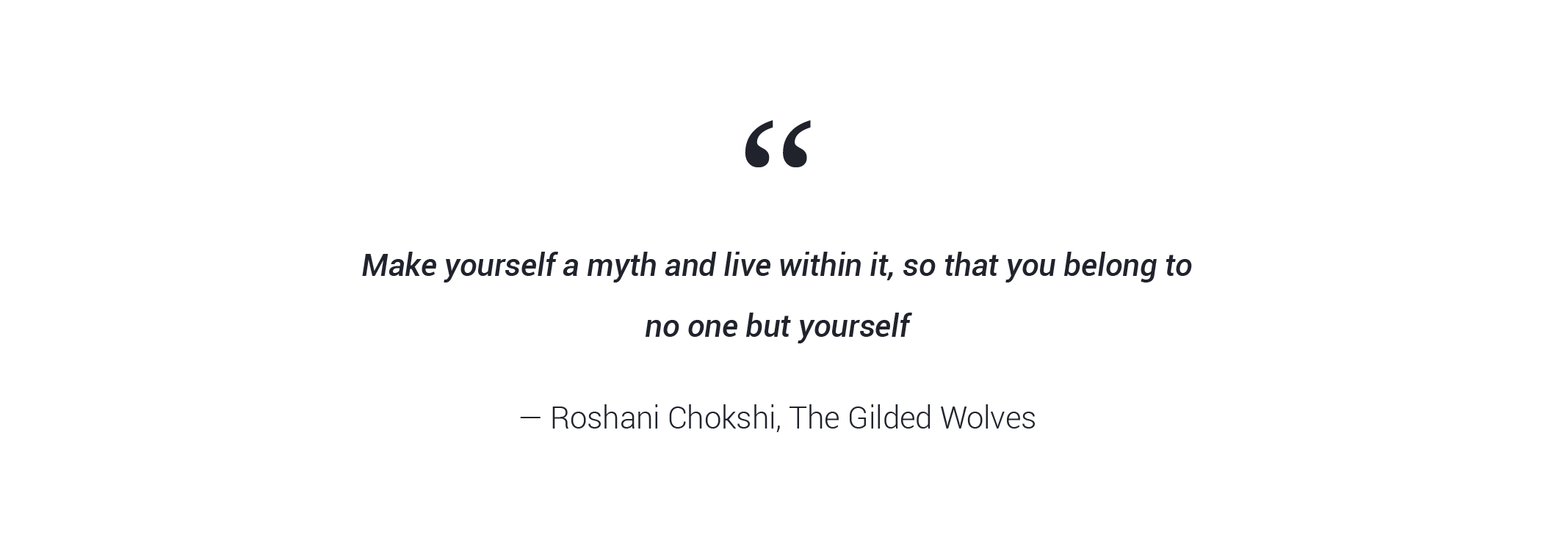
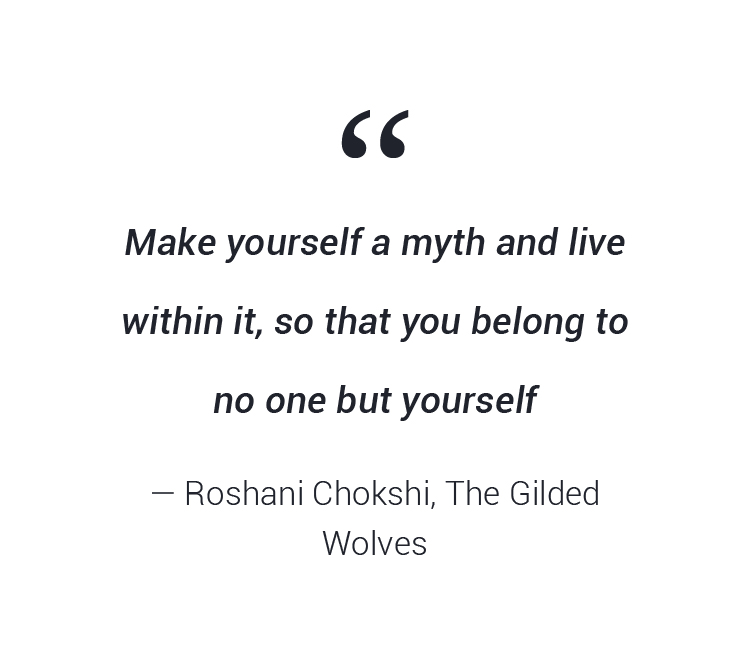
PROGRAMME DETAILS
Mythos consists of ten live and interactive lectures weekly throughout the programme on Saturdays at 5:00 PM (GMT). Eight of these will happened weekly on Saturdays at 5:00 PM (GMT) throughout the programme. Two additional lectures will take place live on two Sundays, also at 5.00 PM (GMT)
All lectures are recorded for later viewing for those unable to attend live or to rewatch.
DURATION: 8 Weeks
START DATE: Saturday 9 October 2021
REGISTRATION CLOSES: Thursday 7 October at midnight (Pacific)
COURSE FEE: $375
COURSE INCLUDES:
Reading pack
Live Lecture Series (recorded)
Guided and facilitated process-based application
Membership of a private student forum for the duration of the programme
Access to all recorded lectures for 12-months after completion of the programme
Certificate of Completion
PROGRAMME DETAILS
Mythos consists of ten live and interactive lectures weekly throughout the programme on Saturdays at 5:00 PM (GMT). Eight of these will happened weekly on Saturdays at 5:00 PM (GMT) throughout the programme. Two additional lectures will take place live on two Sundays, also at 5.00 PM (GMT)
All lectures are recorded for later viewing for those unable to attend live or to rewatch.
DURATION: 8 Weeks
START DATE: Saturday 9 October 2021
REGISTRATION CLOSES: Thursday 7 October at midnight (Pacific)
COURSE FEE: $375
COURSE INCLUDES:
Reading pack
Live Lecture Series (recorded)
Guided and facilitated process-based application
Membership of a private student forum for the duration of the programme
Access to all recorded lectures for 12-months after completion of the programme
Certificate of Completion
REGISTRATION
Registration now open!
Registration closes Thursday 7th of October, midnight (Pacific)
ABSTRACTS
The Importance of Myth for C.G. Jung
by Prof. Roderick Main
In this session we shall explore why myth became for over fifty years one of the central reference points in Jung’s writing and professional practice. We shall tease out how Jung understood myth psychologically, noting some changes to his understanding as his psychological theory developed. And we shall discuss the wide range of scientific, psychotherapeutic, cultural, political, rhetorical, personal, and philosophical uses to which Jung put myth in his various writings.
Myth and Science
by Prof. Dylan B. Futter
In the 6th century BC, some Greek speaking people living on the coast of Asia Minor started thinking in a way that was unprecedented in human history. They gave up on stories of demons and gods and began to account for events in the empirical world in terms of mechanistic laws governing impersonal processes. This story of the emergence of Western science rests on a number of claims. One is that the displacement of myth by science was a Greek accomplishment. Another is that science is superior to myth as a mode of knowing.
In this seminar, I contest the latter claim by arguing that myth and science are complementary for they are concerned with different kinds of knowledge. Myth identifies a question and maintains it as a question; it seeks to preserve a sense of wonder and humility. Myth is less concerned with knowledge of the empirical world than knowledge of self.
Prometheus and Pandora
by Nadia Sels, PhD
Few stories have such a seemingly timeless and universal appeal as the story of Prometheus: more than any other figure from Greek myth, the titan and trickster who stole fire from the gods to give it to humankind (something for which the gods ‘retaliated’ by sending them the first woman, Pandora) still haunts contemporary culture – whether as a symbol of rebellion and creativity, our dangerously ambiguous relation with technology, or simply as a personification of the versatile human mind as such.
In this lecture, we will draw from the work of structuralist anthropologist and historian Jean-Pierre Vernant to explore the story as it was originally told in the poems of Hesiod, all paradoxes included. As a test case for the workings of myth, Prometheus may bring us to a larger question: what makes his story – and mythology as a whole – so inexhaustible, and such an effective tool for (self-) reflection?
“That I may know what the world contains in its innermost being”: The Faustian Myth and its Significance for Jung
by Prof. Paul Bishop
This lecture will survey the history of the Faust legend, and examine the use that Goethe made of the myth in his dramatic poem, Faust. It will consider the reasons for Jung’s fascination with Goethe’s treatment of the legend; indeed, his sense of affinity with the figure that he, as a supposed “illegitimate” child of Goethe, is said to have felt. Finally, it will try and explain why Part Two of Goethe’s Faust constitutes, in the words of Haold Bloom, “the most peculiar yet canonical work of Western literature.”
The Myth of Adonis
by Prof. Robert Segal
I will be applying the theories of J. G. Frazer, author of The Golden Bough and of Jung to the myth of Adonis. The myth, the main sources for which are Apollodorus and Ovid, describes the miraculous birth of a preternaturally beautiful human out of a tree, the fighting over him by Aphrodite and Persephone, his annual division of the year into a third with Persephone in Hades and two thirds on earth with Aphrodite, and his eventual death while hunting. Adonis for Frazer is a mere personification of vegetation. Vegetation does not symbolize Adonis; Adonis symbolizes vegetation.
For Jung, the myth of Adonis originates and functions to present the archetype of the puer and, more, to assess it. The myth serves as a warning to those who identify themselves with the archetype. The life of a puer in myth invariably ends in premature death, which psychologically means the death of the ego and a return to the womb-like unconscious.
‘Dreaming the Myth Onward’: The Re-invention and Re- invigoration of Myth in Neil Gaiman’s Sandman
by Kevin Lu, PhD
An academic study of comics usually begins with a defence of comics as an appropriate medium or springboard to knowledge. Yet in recent years, we have witnessed first-hand the power of comics to capture the imagination and to transcend boundaries, evidenced by the plethora of films and television series based on characters and narratives originating in this particular art form. I will argue that a central reason for this popularity is due to the medium’s ability to ‘dream myths onward’ – its capacity to provide new containers for archetypal motifs central to human experience. The expression of these motifs as archetypal images is only enhanced by the fundamentals of the medium itself; comics are uniquely positioned to convey these core themes through its combination of text and image. In this seminar, I will draw on Neil Gaiman’s magisterial graphic novel series, The Sandman, to express the power of comics and its ability to communicate the inner workings of the human psyche. My aim is twofold: first, to guide colleagues through some of the mechanics of the medium and why it is distinctive in its ability to articulate unconscious processes; second, to provide specific examples from The Sandman where we can witness these mechanics at play – how they shape our engagement with, and understanding of, universal themes that define what it means to live a typically human life.
The Lotus Gaze: Love and Longing in the Ramayana
by Sulagna Sengupta, MA
A ploughed-up infant, a hunchbacked maid, a covetous stepmother, a stone, a mutilated demoness, an ape-queen – the faces of the feminine in The Ramayana are extraordinarily poignant. As one of the oldest surviving epics of the world, The Ramayana’s popularity spans all of south Asia. A young prince’s eventful journey into adulthood through his encounter of extraordinary beings forms the crux of the mythic narrative. Beyond the familiar motifs of heroism and the moral imperatives of an ancient Hindu world, The Ramayana presents an assortment of women characters around whom the heroic adventure unfolds. While demons, sages, animals, birds and forests bring an enchanted quality to the epic, Rama’s longing for Sita colours the inner landscape of his journey, shaping an ontogenetic trajectory more complex than the outer battles. Love and longing surpass all else as the psyche looks for blossoming and completion – a tragic tale that draws on Jung’s ideas to examine the significance of the anima in human culture. This maiden lecture of a depth psychological interpretation of The Ramayana introduces the epic to a Jungian audience for the first time giving a foretaste of a mythological opus more than a millennium old.
Urihi: Archetypal Intersubjectivity in the Yanomami Mythology
by Hannah Hennebert, PhD
This presentation aims to explore the concept of archetypal Intersubjectivity using Yanomami mythology as a background. The word research comes from the Old French re- (expressing intensive force) and cerchier “to search.” Research is a journey, a “Self” search, perhaps self-serving? Questioning where research comes from and who benefits from it helps guide this decolonial approach to Jungian studies.
Urihi: Archetypal Intersubjectivity in the Yanomami Mythology emerged from a minority point of view. The lecture will have four segments: (a) Introduction, (b) Mother Earth or La Pachamama in the Yanomami mythology (c) How the indigenous peoples of the Amazon, and the Yanomami in particular, conceptualize humanity (Urihi), (d) Archetypal Intersubjectivity as a call to ecological awareness in human relationships.
The theories I bring to this presentation are based on the Weltanschauung of an Amazonian woman who believes that myths are healing stories both personally and collectively. This work is part of the advocacy for an academic table where all can sit and dialogue. Furthermore, the belief that relationships are our essence is key to this presentation; therefore, the concept of archetypal Intersubjectivity.
Reimagining my own story
by Dr. Gcina Mhlophe
I speak as a woman of Africa, mother, community builder, arts practitioner and cultural ambassador who has been inspired by the unrelenting power and resilience of my people, even in the worst of times.
I believe in the healing power of story. These uncertain times we live in have compelled us to value the precious gift of life, now, more than ever before. Together we share stories of trauma, grief and triumph. Every living being has a story to tell and they wish to be listened to.
We feel victorious when we give ourselves permission to tell our own individual stories in our unique voices. This way we get to embrace each other’s journeys in all their diversity and imperfections.
In today’s world, with all the gadgets and communication tools, we will manage to not see each other. People often feel lonely in the middle of all the Hussle and bustle around them. May we grow multiple eyes to bear witness to one another’s journeys with renewed compassion, especially to the less fortunate in society. This way we can reimagine our own stories.
Franz Kafka: Connoisseur of Mythical thinking
by Prof. Stanley Corngold
Although one will search in vain throughout Kafka’s work for the word Mythos, one has no hesitation in regarding him as a connoisseur of mythical thinking.
To do so, one must be prepared to vary the concept of mythical thinking with the concepts of allegory and allusion (Andeutung). Many of Kafka’s stories reflect the putative grandeur and coherence of Greek and Roman myths involving gods and heroes as well as so-called second-century, Gnostic myths and visions, onto which he imposes the patterns of contemporary experience. Kafka’s work develops an acute sense of a redoubtable, “crushing” past–a history, both personal and universal—from which there is no escape. This lecture will also allude to Kafka’s complex empirical personality, about which many myths have been accumulated and which need puncturing.
The Importance of Myth for C.G. Jung
by Prof. Roderick Main
In this session we shall explore why myth became for over fifty years one of the central reference points in Jung’s writing and professional practice. We shall tease out how Jung understood myth psychologically, noting some changes to his understanding as his psychological theory developed. And we shall discuss the wide range of scientific, psychotherapeutic, cultural, political, rhetorical, personal, and philosophical uses to which Jung put myth in his various writings.
Myth and Science
by Prof. Dylan B. Futter
In the 6th century BC, some Greek speaking people living on the coast of Asia Minor started thinking in a way that was unprecedented in human history. They gave up on stories of demons and gods and began to account for events in the empirical world in terms of mechanistic laws governing impersonal processes. This story of the emergence of Western science rests on a number of claims. One is that the displacement of myth by science was a Greek accomplishment. Another is that science is superior to myth as a mode of knowing.
In this seminar, I contest the latter claim by arguing that myth and science are complementary for they are concerned with different kinds of knowledge. Myth identifies a question and maintains it as a question; it seeks to preserve a sense of wonder and humility. Myth is less concerned with knowledge of the empirical world than knowledge of self.
Prometheus and Pandora
by Nadia Sels, PhD
Few stories have such a seemingly timeless and universal appeal as the story of Prometheus: more than any other figure from Greek myth, the titan and trickster who stole fire from the gods to give it to humankind (something for which the gods ‘retaliated’ by sending them the first woman, Pandora) still haunts contemporary culture – whether as a symbol of rebellion and creativity, our dangerously ambiguous relation with technology, or simply as a personification of the versatile human mind as such.
In this lecture, we will draw from the work of structuralist anthropologist and historian Jean-Pierre Vernant to explore the story as it was originally told in the poems of Hesiod, all paradoxes included. As a test case for the workings of myth, Prometheus may bring us to a larger question: what makes his story – and mythology as a whole – so inexhaustible, and such an effective tool for (self-) reflection?
“That I may know what the world contains in its innermost being”: The Faustian Myth and its Significance for Jung
by Prof. Paul Bishop
This lecture will survey the history of the Faust legend, and examine the use that Goethe made of the myth in his dramatic poem, Faust. It will consider the reasons for Jung’s fascination with Goethe’s treatment of the legend; indeed, his sense of affinity with the figure that he, as a supposed “illegitimate” child of Goethe, is said to have felt. Finally, it will try and explain why Part Two of Goethe’s Faust constitutes, in the words of Haold Bloom, “the most peculiar yet canonical work of Western literature.”
The Myth of Adonis
by Prof. Robert Segal
I will be applying the theories of J. G. Frazer, author of The Golden Bough and of Jung to the myth of Adonis. The myth, the main sources for which are Apollodorus and Ovid, describes the miraculous birth of a preternaturally beautiful human out of a tree, the fighting over him by Aphrodite and Persephone, his annual division of the year into a third with Persephone in Hades and two thirds on earth with Aphrodite, and his eventual death while hunting. Adonis for Frazer is a mere personification of vegetation. Vegetation does not symbolize Adonis; Adonis symbolizes vegetation.
For Jung, the myth of Adonis originates and functions to present the archetype of the puer and, more, to assess it. The myth serves as a warning to those who identify themselves with the archetype. The life of a puer in myth invariably ends in premature death, which psychologically means the death of the ego and a return to the womb-like unconscious.
‘Dreaming the Myth Onward’: The Re-invention and Re- invigoration of Myth in Neil Gaiman’s Sandman
by Kevin Lu, PhD
An academic study of comics usually begins with a defence of comics as an appropriate medium or springboard to knowledge. Yet in recent years, we have witnessed first-hand the power of comics to capture the imagination and to transcend boundaries, evidenced by the plethora of films and television series based on characters and narratives originating in this particular art form. I will argue that a central reason for this popularity is due to the medium’s ability to ‘dream myths onward’ – its capacity to provide new containers for archetypal motifs central to human experience. The expression of these motifs as archetypal images is only enhanced by the fundamentals of the medium itself; comics are uniquely positioned to convey these core themes through its combination of text and image. In this seminar, I will draw on Neil Gaiman’s magisterial graphic novel series, The Sandman, to express the power of comics and its ability to communicate the inner workings of the human psyche. My aim is twofold: first, to guide colleagues through some of the mechanics of the medium and why it is distinctive in its ability to articulate unconscious processes; second, to provide specific examples from The Sandman where we can witness these mechanics at play – how they shape our engagement with, and understanding of, universal themes that define what it means to live a typically human life.
The Lotus Gaze: Love and Longing in the Ramayana
by Sulagna Sengupta, MA
A ploughed-up infant, a hunchbacked maid, a covetous stepmother, a stone, a mutilated demoness, an ape-queen – the faces of the feminine in The Ramayana are extraordinarily poignant. As one of the oldest surviving epics of the world, The Ramayana’s popularity spans all of south Asia. A young prince’s eventful journey into adulthood through his encounter of extraordinary beings forms the crux of the mythic narrative. Beyond the familiar motifs of heroism and the moral imperatives of an ancient Hindu world, The Ramayana presents an assortment of women characters around whom the heroic adventure unfolds. While demons, sages, animals, birds and forests bring an enchanted quality to the epic, Rama’s longing for Sita colours the inner landscape of his journey, shaping an ontogenetic trajectory more complex than the outer battles. Love and longing surpass all else as the psyche looks for blossoming and completion – a tragic tale that draws on Jung’s ideas to examine the significance of the anima in human culture. This maiden lecture of a depth psychological interpretation of The Ramayana introduces the epic to a Jungian audience for the first time giving a foretaste of a mythological opus more than a millennium old.
Urihi: Archetypal Intersubjectivity in the Yanomami Mythology
by Hannah Hennebert, PhD
This presentation aims to explore the concept of archetypal Intersubjectivity using Yanomami mythology as a background. The word research comes from the Old French re- (expressing intensive force) and cerchier “to search.” Research is a journey, a “Self” search, perhaps self-serving? Questioning where research comes from and who benefits from it helps guide this decolonial approach to Jungian studies.
Urihi: Archetypal Intersubjectivity in the Yanomami Mythology emerged from a minority point of view. The lecture will have four segments: (a) Introduction, (b) Mother Earth or La Pachamama in the Yanomami mythology (c) How the indigenous peoples of the Amazon, and the Yanomami in particular, conceptualize humanity (Urihi), (d) Archetypal Intersubjectivity as a call to ecological awareness in human relationships.
The theories I bring to this presentation are based on the Weltanschauung of an Amazonian woman who believes that myths are healing stories both personally and collectively. This work is part of the advocacy for an academic table where all can sit and dialogue. Furthermore, the belief that relationships are our essence is key to this presentation; therefore, the concept of archetypal Intersubjectivity.
Reimagining my own story
by Dr. Gcina Mhlophe
I speak as a woman of Africa, mother, community builder, arts practitioner and cultural ambassador who has been inspired by the unrelenting power and resilience of my people, even in the worst of times.
I believe in the healing power of story. These uncertain times we live in have compelled us to value the precious gift of life, now, more than ever before. Together we share stories of trauma, grief and triumph. Every living being has a story to tell and they wish to be listened to.
We feel victorious when we give ourselves permission to tell our own individual stories in our unique voices. This way we get to embrace each other’s journeys in all their diversity and imperfections.
In today’s world, with all the gadgets and communication tools, we will manage to not see each other. People often feel lonely in the middle of all the Hussle and bustle around them. May we grow multiple eyes to bear witness to one another’s journeys with renewed compassion, especially to the less fortunate in society. This way we can reimagine our own stories.
Franz Kafka: Connoisseur of Mythical thinking
by Prof. Stanley Corngold
Although one will search in vain throughout Kafka’s work for the word Mythos, one has no hesitation in regarding him as a connoisseur of mythical thinking.
To do so, one must be prepared to vary the concept of mythical thinking with the concepts of allegory and allusion (Andeutung). Many of Kafka’s stories reflect the putative grandeur and coherence of Greek and Roman myths involving gods and heroes as well as so-called second-century, Gnostic myths and visions, onto which he imposes the patterns of contemporary experience. Kafka’s work develops an acute sense of a redoubtable, “crushing” past–a history, both personal and universal—from which there is no escape. This lecture will also allude to Kafka’s complex empirical personality, about which many myths have been accumulated and which need puncturing.
FACULTY
Professor Roderick Main works at the University of Essex, UK, where he is Professor in the Department of Psychosocial and Psychoanalytic Studies and Director of the Centre for Myth Studies. He has a BA and MA in Classics from the University of Oxford and a PhD in Religious Studies from Lancaster University. He is the author of The Rupture of Time: Synchronicity and Jung’s Critique of Modern Western Culture (Brunner-Routledge, 2004) and Revelations of Chance: Synchronicity as Spiritual Experience (SUNY, 2007), editor of Jung on Synchronicity and the Paranormal (Princeton/Routledge, 1997), and co-editor of Myth, Literature, and the Unconscious (Karnac, 2013), Holism: Possibilities and Problems (Routledge, 2020), and Jung, Deleuze, and the Problematic Whole (Routledge, 2021).
Dylan Futter is an Associate Professor in Philosophy at the University of the Witwatersrand, where he is coordinator of the Applied Ethics for Professionals Programme. His research is primarily in ethics and ancient Greek philosophy. He has published widely on these topics; his book manuscript, Socrates’ Search for Wisdom, is contracted by Routledge and currently under review.
Dr. Hannah Hennebert is a Brazilian-American independent scholar. She holds a Ph. D. in Psychology with concentration in Jungian Studies from Saybrook University, an M.A. in Counseling from EMU. Hannah has presented at various international conferences. Her integrative therapeutic approach includes neuroscience and depth psychology. Dr. Hennebert currently works as a clinician in a private practice in Bloomington, Indiana. She enjoys going for a walk in the nearby forest, dancing, drawing mandalas, and drumming.
Stanley Corngold is Professor (emeritus) of German and Comparative Literature and Princeton University, where he taught for 45 years. On his retirement, he received the Howard Behrman Award for Distinguished Achievement in the Humanities at Princeton and was elected Member of the American Academy of Arts and Sciences. Corngold, a former President of the Kafka Society of America, is the author of ten books (two in press on the work of Thomas Mann) and ten editions, mainly on the work of Franz Kafka, although he has also published essays on Goethe, Hölderlin, Nietzsche, Rilke, Musil, Benjamin, Adorno, and modern French and English writers.
Robert Segal is Sixth Century Chair in Religious Studies at the University of Aberdeen. He teaches and writes on theories of myth and theories of religion. He was introduced to Jung by a philosopher of religion at Princeton University, where he received his PhD in religious studies. Among the books he has written or edited are The Poimandres as Myth, Joseph Campbell in Quest of the Hero, Jung on Mythology, The Gnostic Jung and Theorizing about Myth (among others). He has recently been honoured with a Festschrift: Explaining, interpreting, and Theorizing Religion and Myth: Contributions in Honor of Robert A Segal.
Nadia Sels teaches art history at PXL-MAD School of Arts (Hasselt) and mythology at Ghent University. Her research explores the common denominator between art and mythology, as two fields that are part of a continuum: she approaches both as expressions of the way in which humans use analogous thinking and metaphor to find meaning and orientation in an inherently meaningless and overwhelming reality. This historical process does not only run through concepts, but starts out from a bodily, sensory involvement with the world.
Sulagna Sengupta, MA is a Jungian scholar based in Bangalore, India. She is the author of ‘Jung in India’ (2013), originally published by Spring Journal Books, USA, and several other recent papers. Sulagna is currently doing her PhD in Jungian Studies, working on the Indian epic The Ramayana at the Department of Psychosocial and Psychoanalytic Studies, University of Essex, U.K.
Paul Bishop is William Jacks Chair of Modern Languages at the University of Glasgow. He studied French and German at Magdalen College, Oxford, and has published various books and articles on German intellectual history, particularly Jung and the tradition of analytical psychology.
Dr. Gcina Mhlophe is an author, poet, playwright, director, performer and storyteller. Influenced by her grandmother’s tales when she was a child, Mhlophe’s written and performance talent has transported her from South Africa to South and North America to Europe, Greenland and Japan. She has performed her stories in theatres like Royal Albert Hall, the Kennedy Centre in the US and collaborated with Ladysmith Black Mambazo on a children’s CD. She again worked with Ladysmith Black Mamabazo and Francis Bebey quartet in a unique production, Africa at the Opera, which toured Opera houses in Germany.
Dr. Kevin Lu is the Senior Lecturer and Director of the MA Jungian and Post- Jungian Studies in the Department of Psychosocial and Psychoanalytic Studies, University of Essex. He is a former member of the Executive Committee of the International Association for Jungian Studies and a member of Adjunct Faculty at Pacifica Graduate Institute. Kevin’s publications include articles and chapters on Jung’s relationship to the discipline of history, Arnold J. Toynbee’s use of analytical psychology, critical assessments of the theory of cultural complexes, sibling relationships in the Chinese/Vietnamese Diaspora, racial hybridity, and Jungian perspectives on graphic novels and their adaptation to film.
FACULTY
Professor Roderick Main works at the University of Essex, UK, where he is Professor in the Department of Psychosocial and Psychoanalytic Studies and Director of the Centre for Myth Studies. He has a BA and MA in Classics from the University of Oxford and a PhD in Religious Studies from Lancaster University. He is the author of The Rupture of Time: Synchronicity and Jung’s Critique of Modern Western Culture (Brunner-Routledge, 2004) and Revelations of Chance: Synchronicity as Spiritual Experience (SUNY, 2007), editor of Jung on Synchronicity and the Paranormal (Princeton/Routledge, 1997), and co-editor of Myth, Literature, and the Unconscious (Karnac, 2013), Holism: Possibilities and Problems (Routledge, 2020), and Jung, Deleuze, and the Problematic Whole (Routledge, 2021).
Dylan Futter is an Associate Professor in Philosophy at the University of the Witwatersrand, where he is coordinator of the Applied Ethics for Professionals Programme. His research is primarily in ethics and ancient Greek philosophy. He has published widely on these topics; his book manuscript, Socrates’ Search for Wisdom, is contracted by Routledge and currently under review.
Dr. Hannah Hennebert is a Brazilian-American independent scholar. She holds a Ph. D. in Psychology with concentration in Jungian Studies from Saybrook University, an M.A. in Counseling from EMU. Hannah has presented at various international conferences. Her integrative therapeutic approach includes neuroscience and depth psychology. Dr. Hennebert currently works as a clinician in a private practice in Bloomington, Indiana. She enjoys going for a walk in the nearby forest, dancing, drawing mandalas, and drumming.
Stanley Corngold is Professor (emeritus) of German and Comparative Literature and Princeton University, where he taught for 45 years. On his retirement, he received the Howard Behrman Award for Distinguished Achievement in the Humanities at Princeton and was elected Member of the American Academy of Arts and Sciences. Corngold, a former President of the Kafka Society of America, is the author of ten books (two in press on the work of Thomas Mann) and ten editions, mainly on the work of Franz Kafka, although he has also published essays on Goethe, Hölderlin, Nietzsche, Rilke, Musil, Benjamin, Adorno, and modern French and English writers.
Robert Segal is Sixth Century Chair in Religious Studies at the University of Aberdeen. He teaches and writes on theories of myth and theories of religion. He was introduced to Jung by a philosopher of religion at Princeton University, where he received his PhD in religious studies. Among the books he has written or edited are The Poimandres as Myth, Joseph Campbell in Quest of the Hero, Jung on Mythology, The Gnostic Jung and Theorizing about Myth (among others). He has recently been honoured with a Festschrift: Explaining, interpreting, and Theorizing Religion and Myth: Contributions in Honor of Robert A Segal.
Nadia Sels teaches art history at PXL-MAD School of Arts (Hasselt) and mythology at Ghent University. Her research explores the common denominator between art and mythology, as two fields that are part of a continuum: she approaches both as expressions of the way in which humans use analogous thinking and metaphor to find meaning and orientation in an inherently meaningless and overwhelming reality. This historical process does not only run through concepts, but starts out from a bodily, sensory involvement with the world.
Sulagna Sengupta, MA is a Jungian scholar based in Bangalore, India. She is the author of ‘Jung in India’ (2013), originally published by Spring Journal Books, USA, and several other recent papers. Sulagna is currently doing her PhD in Jungian Studies, working on the Indian epic The Ramayana at the Department of Psychosocial and Psychoanalytic Studies, University of Essex, U.K.
Paul Bishop is William Jacks Chair of Modern Languages at the University of Glasgow. He studied French and German at Magdalen College, Oxford, and has published various books and articles on German intellectual history, particularly Jung and the tradition of analytical psychology.
Dr. Gcina Mhlophe is an author, poet, playwright, director, performer and storyteller. Influenced by her grandmother’s tales when she was a child, Mhlophe’s written and performance talent has transported her from South Africa to South and North America to Europe, Greenland and Japan. She has performed her stories in theatres like Royal Albert Hall, the Kennedy Centre in the US and collaborated with Ladysmith Black Mambazo on a children’s CD. She again worked with Ladysmith Black Mamabazo and Francis Bebey quartet in a unique production, Africa at the Opera, which toured Opera houses in Germany.
Dr. Kevin Lu is the Senior Lecturer and Director of the MA Jungian and Post- Jungian Studies in the Department of Psychosocial and Psychoanalytic Studies, University of Essex. He is a former member of the Executive Committee of the International Association for Jungian Studies and a member of Adjunct Faculty at Pacifica Graduate Institute. Kevin’s publications include articles and chapters on Jung’s relationship to the discipline of history, Arnold J. Toynbee’s use of analytical psychology, critical assessments of the theory of cultural complexes, sibling relationships in the Chinese/Vietnamese Diaspora, racial hybridity, and Jungian perspectives on graphic novels and their adaptation to film.
